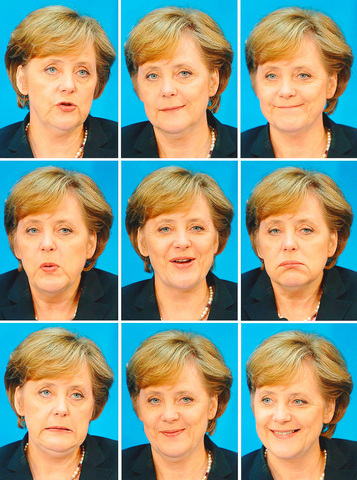Angela Merkel becomes chancellor, but outgoing Chancellor Gerhard Schroeder's Social Democrats get an equal number of seats in her Cabinet. Germany's "grand coalition" deal ends weeks of political crisis but seems a recipe for paralysis -- and another early election.
Still, on issues from reforming the welfare state to tackling high unemployment, there is a chance for some common ground -- and legislators from both parties could team up to enable Merkel to push through parts of her reformist agenda.
The stakes are high for Germany and Europe, which is struggling to find a way to pay for its social protections while improving sluggish growth amid global competition from countries where businesses aren't weighed down by European-style benefits and payroll taxes.

PHOTO: EPA
Indeed, the muddled result in Germany -- Europe's largest economy -- is emblematic of a wider malaise at the heart of Europe: People seem to be aware of the need for the type of painful reform that Merkel represents but are afraid of granting a mandate for its execution.
Merkel, a former scientist, herself once dismissed the idea of a coalition involving the Social Democrats, describing it as "stagnation."
But she had to strike the deal because she couldn't secure an outright majority to enact changes such as making it easier to fire workers at small companies or for companies and workers to opt out of the regional wage bargaining favored by unions. The Social Democrats have vowed to stop such changes.
And she'll have to turn the Foreign Ministry over to the Social Democrats, who applauded Schroeder's willingness to stand up to Washington over the war in Iraq. She and the Social Democrats have opposite stances on EU membership for Turkey -- she is against, they are in favor.
She has said she would continue Schroeder's policy of supporting reconstruction in Iraq by training security personnel outside the country without sending German troops.
There might be room for some horsetrading on the key economic questions. For instance, the left could agree to some loosening of worker protections, so long as the regional wage system isn't touched.
And the two sides appear to have common ground on fixing Germany's budget deficit, which will require restraint in new spending.
The result will be both parties favoring their centrist wings; the advocates of market reforms in the Social Democrats and the union-friendly members of Merkel's Christian Democrats. Merkel went so far as to praise Schroeder's limited reforms, such as cutting long-term jobless benefits; she just said they didn't go far enough.
But as might be expected with a marriage of convenience, the coalition is not generating much enthusiasm. Bild, the country's biggest paper, lamented "Grand Coalition: We Pay and Pay and Pay," referring to expected revenue-raising measures to fix the budget deficit.
Merkel is hardly a Margaret Thatcher, who as British prime minister in the 1980s launched a sweeping attack on labor unions. Instead, she campaigned on a modest pledge to trim payroll taxes by two percentage points -- but wanted to make up the lost revenue by raising value-added tax.
One secret weapon of the new government: low expectations.
If people anticipate it will be able to do nothing, even minimal reforms will look like success. So it was with the last time Germany tried a left-right coalition, from 1966-69; many though it wouldn't last, but it held out for three years.
If Merkel reads her history she may note that after the two parties worked together, the next election produced a government led by the Social Democrats.

‘EYE FOR AN EYE’: Two of the men were shot by a male relative of the victims, whose families turned down the opportunity to offer them amnesty, the Supreme Court said Four men were yesterday publicly executed in Afghanistan, the Supreme Court said, the highest number of executions to be carried out in one day since the Taliban’s return to power. The executions in three separate provinces brought to 10 the number of men publicly put to death since 2021, according to an Agence France-Presse tally. Public executions were common during the Taliban’s first rule from 1996 to 2001, with most of them carried out publicly in sports stadiums. Two men were shot around six or seven times by a male relative of the victims in front of spectators in Qala-i-Naw, the center

Incumbent Ecuadoran President Daniel Noboa on Sunday claimed a runaway victory in the nation’s presidential election, after voters endorsed the young leader’s “iron fist” approach to rampant cartel violence. With more than 90 percent of the votes counted, the National Election Council said Noboa had an unassailable 12-point lead over his leftist rival Luisa Gonzalez. Official results showed Noboa with 56 percent of the vote, against Gonzalez’s 44 percent — a far bigger winning margin than expected after a virtual tie in the first round. Speaking to jubilant supporters in his hometown of Olon, the 37-year-old president claimed a “historic victory.” “A huge hug

Two Belgian teenagers on Tuesday were charged with wildlife piracy after they were found with thousands of ants packed in test tubes in what Kenyan authorities said was part of a trend in trafficking smaller and lesser-known species. Lornoy David and Seppe Lodewijckx, two 19-year-olds who were arrested on April 5 with 5,000 ants at a guest house, appeared distraught during their appearance before a magistrate in Nairobi and were comforted in the courtroom by relatives. They told the magistrate that they were collecting the ants for fun and did not know that it was illegal. In a separate criminal case, Kenyan Dennis

The US will help bolster the Philippines’ arsenal and step up joint military exercises, Manila’s defense chief said, as tensions between Washington and China escalate. The longtime US ally is expecting a sustained US$500 million in annual defense funding from Washington through 2029 to boost its military capabilities and deter China’s “aggression” in the region, Philippine Secretary of Defense Gilberto Teodoro said in an interview in Manila on Thursday. “It is a no-brainer for anybody, because of the aggressive behavior of China,” Teodoro said on close military ties with the US under President Donald Trump. “The efforts for deterrence, for joint resilience